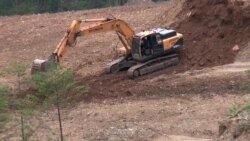Environmentalists in South Korea are protesting a Winter Olympics construction project to build a ski slope through a 500-year-old protected forest.
While there is strong national support for hosting the 2018 Pyeongchang Winter Olympics, the controversy over Gariwang mountain is the latest indication that public concerns are growing over the costs and in this case the ecological damage of staging the games.
Olympic Construction, Environmental Destruction
The ground is already being cleared on Gariwang Mountain, near the ski resort town of Pyeongchang in South Korea’s Gangwon province, to build a ski racecourse for the Winter Olympics. Thousands of trees have been removed and bulldozers are digging up large swathes of land and leveling the dirt. The site looks like a super highway is being carved out of the rich forest terrain.
Activists with Green Korea United however have not given up on their efforts to shut down this project to prevent what they say will be permanent damage to this fragile ecosystem.
“If they give up and move to another site to establish a ski resort, then it could be recovered, though it would take some years, decades.” said Cho Sang-hee, a conservationist with the group.
The position of the South Korean Pyeongchang Olympics Organizing Committee is that Gariwang is the only site that fits the international slope criteria, that is to say it is the only nearby mountain tall and steep enough, with a vertical drop of 800 to 1,100 meters required for Alpine skiing competitions. The Olympics organizers have promised to limit the environmental impact of the competition site, by designing one course to be used for both men’s and women’s events. Normally there are two separate courses.
The Gangwon provincial government says over 1,000 trees uprooted from the site have been transplanted and will be returned as part of the forest restoration plan that will be enacted once the 2018 Olympics end. But by then environmentalists say it will be too late.
Sacred Forest
At the base of Gariwang Mountain there is an ancient stone sign dating back hundreds of years to the Chosun dynasty. The sign marks the surrounding land as a royal forbidden area, a protected preserve where wild ginseng was allowed to grow for the exclusive use of the king.
“The government designated this area as a protected region at that time, and that history has continued for about 500 years since then,” said Lee Byungchun, an activist who is now retired from the Korea National Arboretum.
The mountain is considered a sacred place to Koreans he says and its diverse and fragile eco-system has been preserved for half a millennia. Shale rock formations mixed with deep-rooted trees create natural air pockets to hold in moisture and cool air and support layers of plant, insect and animal life. There are many species of plants native to the mountains of Korea.
The mountain was officially designated a national protected forest in 2008 but that designation was lifted in 2012 for this Olympic construction project.
The Olympic committee disputes claims that Gariwang has been a sacred preserve for 500 years. They say until the 1960s local farmers cut down trees on the mountain for firewood and until the 1970s a lumber company conducted logging operations there. Gariwang has also never been designated as national or local park.
The environmentalists are skeptical of the Olympic committee’s promises to restore the mountain forest. They say the chemicals will be used to treat the ski course and to make snow, and parts of the course will be likely be paved with cement or asphalt to create ideal racing conditions. They are concerned that these treatments will permanently scar the mountain.
High Financial Costs
Korea Green United says the estimated cost of building this ski slope that will only be used during the 2018 Olympic is over $150 million and the cost of removing the site will be close to $100 million.
Rather than try to restore the mountain, they worry that after the games are over authorities will attempt to make the ski slope a permanent tourist attraction in hopes of recouping some the costs put into its construction.
In a recent email to VOA, the Gangwon provincial government, which governs Pyeongchang, strongly denied Korea Green United’s claims. No chemicals will be used for snowmaking it said. The government confirmed plans to recover the area “with outstanding ecological conditions” to the level that existed before the damage. The budget for the forest recovery, it said, will be confirmed next year. And the South Korea Forestry Service formed an advisory committee that includes representatives from various environmental groups to ensure that the entire process be conducted in a transparent manner.
Reports that Gangwon province has already been struggling with debt to build some of the facilities for the Olympics has fueled public concerns over the rising costs of hosting games.
South Korea’s Ministry of Culture, Sports and Tourism expects the total cost of the Pyeongchang Olympics to exceed $10 billion, which is much less than the $50 billion Russia spent on the Sochi Olympics.
South Koreans hosted the Summer Olympics in Seoul in 1988, and co-hosted the soccer World Cup with Japan in 2002.
VOA Seoul Producer Youmi Kim contributed to this report.






